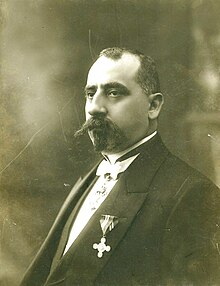Andrei Lyaptschew
Andrei Tassew Lyaptschew ( Bulgarian Андрей Тасев Ляпчев ; born November 30, 1866 in Resen , (now Macedonia ); † November 6, 1933 in Sofia ) was a Bulgarian politician , Prime Minister , and co-founder and member of the Macedonian Scientific Institute .
biography
Family, studies and professional career
Lyaptschew, whose birthplace was part of the Ottoman Empire at the time, was born into a traditional family. His father, Mug, was one of the champions for an independent Bulgarian Orthodox Church . Andrei had five brothers; his brother Nikola was killed during the Ilinden uprising .
After finishing the Bulgarian school in Resen, Lyaptschew received a scholarship for excellent students from the Bulgarian Church and studied at the men's school of the Bulgarians in Thessaloniki . As a student he took part in the movement to unite Bulgaria and Eastern Rumelia in 1885 . He then completed a degree in finance and economics at the universities of Zurich , Berlin and Paris , which he graduated in 1893.
From 1894 to 1900 he worked as an official in the Ministry of Finance and then as a journalist . As such, he supported the Bulgarian Macedonia-Adrianople Revolutionary Committee (later known as the Inner Macedonian Revolutionary Organization ) and in 1903 the Ilinden uprising in Macedonia and Thrace . From its founding in 1898 to 1919 he was the publisher and editor-in-chief of the newspaper Prjapowez (bulg. "Пряпорец"), the organ of the Democratic Party founded in 1886 .
MP and Minister
Lyaptschew began his actual political career in 1908 with the election as a member of the National Assembly , which he took part in the Balkan Wars , with the exception of a short break between 1911 and 1913, when he was a volunteer in the Macedonia-Adrianople Volunteer Corps of the Bulgarian Army Belonged to death.
On January 29, 1908, he was appointed Minister of Commerce and Agriculture in the government of the leader of the Democratic Party, Aleksandar Malinov . In the same year he was one of the signatories of Bulgaria's declaration of independence from the Ottoman Empire on October 5th. On September 18, 1910, he was appointed Minister of Finance by Malinow and held this office until the end of his term on March 29, 1911.
On June 21, 1918, he was reappointed finance minister in Malinov's cabinet. As such he negotiated with the diplomat Simeon Radew and General Ivan Russew the armistice of Thessaloniki with the powers of the Entente , which they signed on September 29, 1918. Tsarist Bulgaria thus admitted its defeat in the First World War . On October 17, 1918, he also took over the office of Minister for Agriculture and Forests.
On November 28, 1918, he was named the first civil war minister by Malinov's successor as prime minister, Teodor Teodorow . He held this office until May 7, 1919. In the following years he developed into an opponent of the increasingly dictatorial Prime Minister Aleksandar Stambolijski , who had him arrested in 1922.
After the overthrow of the Stamboliysky government in the coup led by Aleksandar Zankov on June 9, 1923 , he was released from prison and during Zankov's tenure, leader of the multi-party Democratic Alliance, which took over ministerial offices in Zankov's cabinet, while Lyaptschew renounced it .
Prime Minister from 1926 to 1931
On January 4, 1926, he was appointed as the successor of Zankow as Prime Minister of a government of Democratic Unity and the National Liberal Party . At the same time he took over the office of 'Minister of the Interior and National Health' in his cabinet.
As Prime Minister he made particular efforts to increase Bulgaria's international reputation after the lost First World War. In 1927 and 1928, after negotiations with the League of Nations, he obtained the approval of two loans to support the return of Bulgarian war refugees from Yugoslavia and to rebuild the destroyed economy. During his reign, the Briand-Kellogg Pact was signed in 1929 .
In contrast to his predecessor, he introduced a more moderate policy, which also resulted in an amnesty for communist prisoners, although he, too , adhered to the ban on the Communist Party . He also lifted the trade union ban and passed a law introducing the eight-hour day . He also promoted the modernization of agriculture through the establishment of cooperatives .
His government's tolerance for the violent Inner Macedonian Revolutionary Organization ( Вътрешна Македонска Революционна Организация (IMRO)) soon led to tensions with Greece and Yugoslavia. The poor economic situation caused by the global economic crisis and the rejection of some of his coalition partners favored the electoral defeat in the election to the National Assembly on May 29, 1931.
On June 29, 1931, he was replaced as Prime Minister by his former party friend Malinov .
Web links
- Biographical information in rulers.org
- Bulgaria 1896-1914
- Bulgaria 1918–1926
- Bulgaria 1926-1934
- Homepage of the Democratic Party
Individual evidence
- ↑ Founder member of the Macedonian Scientific Institute (Bulgarian) ( Memento of the original from April 19, 2012 in the Internet Archive ) Info: The archive link has been inserted automatically and has not yet been checked. Please check the original and archive link according to the instructions and then remove this notice.
- ^ Simeon Radew : Early Memoirs , 1967.
| predecessor | Office | successor |
|---|---|---|
| Aleksandar Zankow |
Prime Minister of Bulgaria 1926–1931 |
Aleksandar Malinov |
| personal data | |
|---|---|
| SURNAME | Lyaptschew, Andrei |
| ALTERNATIVE NAMES | Lyaptschew, Andrei Tazew (full name); Ляпчев, Андрей Тасев (Bulgarian) |
| BRIEF DESCRIPTION | Bulgarian politician and prime minister |
| DATE OF BIRTH | November 30, 1866 |
| PLACE OF BIRTH | Resen , Macedonia |
| DATE OF DEATH | November 6, 1933 |
| Place of death | Sofia |


